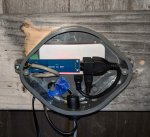Hi, I am new to forum ... so Hi! ... this is going to be a lengthy post but bear with me please!
After reading this thread and a longer one (previous/older) about automation, I would like to ask if someone have tried something I believe a bit different (simpler at least in my mind because of my limited experience and mainly because of my current setup).
Before asking about my approach (and for my benefit as I write my current understanding) I would like to summarize what I believe you have done with all your hard work (thanks by the way)
1) Changed the RS485 data connection from aqualink power center from either wired terminal, Radio Frequency transceiver to the PDA or Wifi "iaqualink" (not sure about this one) to a RS485 - USB adapter to communicate serial to a RPi.
2) Read the serial communication aqualink protocol (looks a bit similar to Modbus, at least to my limited understanding: ID - Command - Data) and translate either with python or C and make it available to a web page, API and MQTT I believe. All of this processed on the RPi
3) Send commands to aqualink "brains" in the power center "emulating" the different screens and button pressed.
I know it does a lot more and correct me if I am wrong but to me it looks very similar (with a lot of caveats) to dumb terminals communicating to a server in a similar fashion as an older webpage browser and web server used to work.
1) Client (Dumb terminal) request info (by answering to its ID to the constant server poling)
2) Server sends a page (Screen data/layout)
3) Client in the specified time (very tricky) acknowledges and sends a command (limited to the available buttons)
4) Server do the requested action if any and "serves" the corresponding page (Screen data/layout)
5) Repeats 3 and 4 until client timeouts.
Assuming this is relatively right, this is my setup:
1) I have the aqualink RF PDA working just fine
2) I have some home automation using the following:
a) RPi 3 running Openhab 2.0 (open source home automation software)
b) A few Phillips hue lights controlled using Openhab binding (driver)
c) A Logitech harmony hub also controlled by Openhab for my media (Music, TV, etc.)
d) A few DYI smart switches and lights (and other stuff: alarm clock, temperature/Humidity, etc.) made with ESP8266 and communicating to Opoenhab via MQTT also running on the RPi.
e) I use a Node red dashboard also on the RPi for GUI to control/manage my home automation.
3) I would like to integrate my pool management/information as much as possible with the rest of my home automation.
For my setup adding another RPi is a bit overkill for a few reasons: RPi maintenance (configuration, upgrades/updates), Physical environment, SD card overtime corruption, etc ... but mainly the fact that it mostly be used as a "glorified" wireless serial connection to my other RPi doing all the heavy lifting.
This is what I have in mind:
1) Use a cheap MAX485 Module (RS-485 to TTL for less than a $1.00 USD) to connect to a ESP8266 (also very cheap ) via RX/TX pins to create my wireless serial connection. I believe I will need some logic level converter (also cheap) for the 3.3V to 5V. logic.
2) For the aqualink "Translation":Use all my home automation setup as is (via MQTT) and have the ESP8266 do all the aqualink screen/buttons translation and timing back and forth. (other option would be to use it just as a serial bridge and do all the processing on the RPi, using code already written)
I do all my ESP8266 firmware as an Arduino and already have a standard for it to communicate via MQTT, do Over the Air (OTA) updates and communicate to my Openhab home automation server.
So after the long post here are my questions:
1) Does it sounds reasonable to make a "serial wireless bridge"?
2) Has anyone tried this? (Couldn't find anything in the forum or "googling")
3) Would somebody else benefit if I give it a try? (and may be help me a bit if possible)
Most of the programming logic thankfully is already done. It would be a matter of porting it to Arduino or reusing exiting code.
Thanks.


